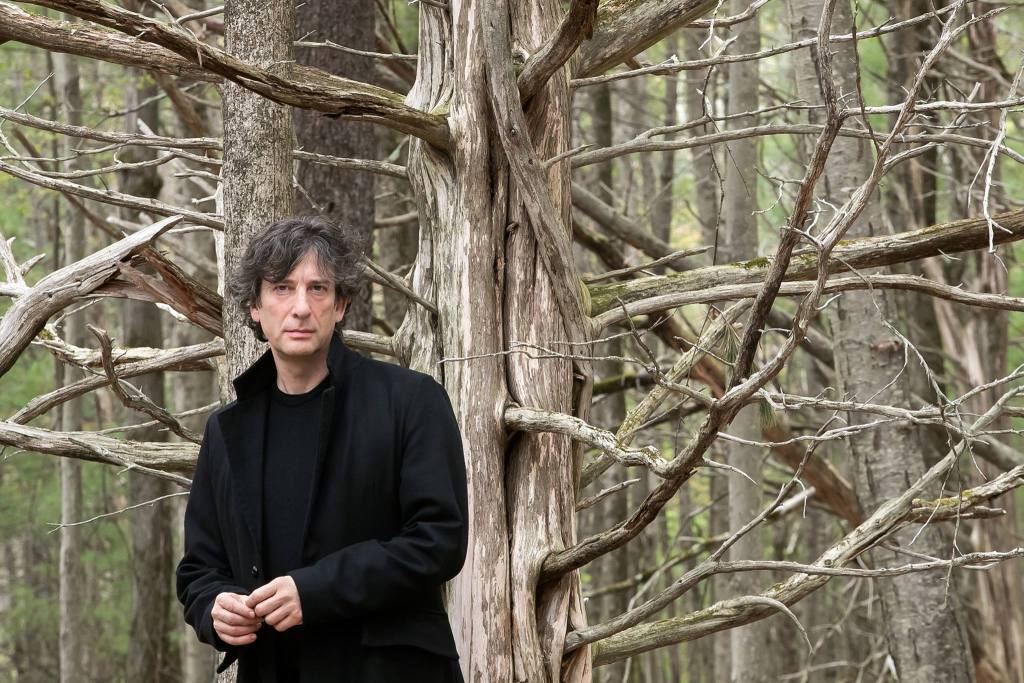Storytelling is the oldest of all the arts. Down through the centuries, human beings have shared their experiences and feelings through spoken word. These words were later written down and preserved in tomes and texts, copied onto palm leaves, sandwiched between wood covers, or bound with vellum. Masterful storytellers have always been able to use their tales to make sense of the world and to share that understanding with others … or rather, in the words of Neil Gaiman, “I make things up and write them down.” Although to be fair, no one makes things up and writes them down with quite the same panache and whimsical flair as Gaiman.
Neil Gaiman, who will be at UCSB’s Campbell Hall on Saturday, May 11, to close the 2018-19 season for UCSB Arts & Lectures’ Word of Mouth series, is one of the most celebrated writers of our time; his popular and critically acclaimed books bend genres while reaching audiences of all ages. Gaiman’s best-selling works range from the groundbreaking Sandman graphic novels, to fantasy novel-turned-television-series American Gods, to beloved children’s literature such as Coraline and The Graveyard Book.
Multiple compilations of his short stories have been published, books stuffed to the brim with fantastical worlds and unusual creatures, but which are entirely human and painfully relatable at heart. His most recent book, Norse Mythology, crafts the ancient stories into a novelistic arc featuring the larger-than-life northern European gods in all of their fierce, passionate glory. Good Omens, a cheeky, apocalyptic adventure that was written in collaboration with renowned fantasy novelist Terry Pratchett, will be premiering as an Amazon Prime miniseries May 31. Gaiman has penned episodes of BBC’s Doctor Who (“The Doctor’s Wife” in season six remains a particular audience favorite) and Neverwhere, an original BBC series by Gaiman, was later reimagined as a novel, a graphic novel, a radio dramatization, and a play. His ability to move between and throughout every imaginable form of storytelling has lent itself to a worldwide recognition as one of the world’s greatest living storytellers.
As a man who has left his fingerprints on so many different literary and creative forms, his work attracts a wildly varied audience that has found a common ground in their love of his stories. My first introduction to Gaiman’s work was the film MirrorMask, produced by the Jim Henson Company in 2005. A friend of mine herded the small group of us through the Lower East Side of Manhattan to Sunshine Cinema on Houston Street while rambling about Gaiman with the sort of fanatical enthusiasm typically reserved for teenagers at Jonas Brothers concerts. The film shared a similar style to Labyrinth and The Dark Crystal, other Jim Henson Company fantasy titles, and the combination of MirrorMask’s colorful, otherworldly visuals and fantasy concepts mixed with the archetypal story of a girl coming of age, clashing with her parents, and yearning to find a life of her own resonated deeply within me. In the years to come, I would discover Gaiman’s other works — novels, short stories, and a particularly dark Christmas poem that haunts me each December. I would listen to his commencement speech to the University of the Arts graduating class of 2012, and would later hold my breath and squeeze my eyes shut as his words were tattooed onto the inner part of my arm in black ink, a reminder that when life gets hard, as it inevitably will, “make good art.”
In his live event at Campbell Hall on Saturday, Gaiman will tell and read stories, answer questions, and, in his own words, “amaze, befuddle and generally delight.” Be sure not to miss the “Ask Neil Gaiman a Question” table to write down any questions you may have, whether it’s about Gaiman’s favorite memory of Terry Pratchett, his writing routine, or what he likes to eat for breakfast. The unscripted nature of these appearances, sometimes called “Evenings with Neil Gaiman,” guarantees that this event at Campbell Hall will be a unique, one-of-a-kind gathering unlike any other.
For those of you who are unfamiliar with the works of Neil Gaiman and would like to learn more, consider this recommendation list a starter pack.
Good Omens by Neil Gaiman and Terry Pratchett, 1990
American Gods by Neil Gaiman, 2001
Anansi Boys by Neil Gaiman, 2005
Fragile Things: Short Fictions and Wonders by Neil Gaiman, 2006

